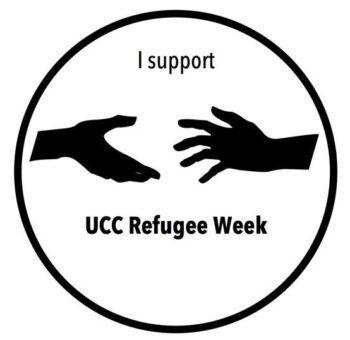
We were delighted to host a seminar on racism and anti-racism on 23rd February 2021. It was led by Eric Ehigie of Black and Irish and Diana Siwela of MASI the Movement of Asylum-Seekers in Ireland. This was part of UCC’s Sanctuary University Week 2022 which the Praxis Project is happy to support. Thanks to all the UW students and guests who attended. Below is a blog about the event from Eric Ehigie and Diana Siwela.
 Eric Ehigie is the Politics Coordinator at Black and Irish, the host of the Engaging with Eric Podcast, co-host of the Political inCorrectors Podcast, and a community activist. He studies Law and Business at NUI Galway.
Eric Ehigie is the Politics Coordinator at Black and Irish, the host of the Engaging with Eric Podcast, co-host of the Political inCorrectors Podcast, and a community activist. He studies Law and Business at NUI Galway.
Eric Ehigie
Photo of Diana Siwala on the way!
Diana Siwela a member of Movement of assylum seekers in lreland(Masi). Masi is a platform for assylum seekers to join together in unity and purpose. We seek justice, freedom and dignity for all assylum seekers.
Eric’s Blog
We began the workshop by running through the topics that we planned to cover with the participants; namely, the working definition of the word “racism” that we chose to use, the creation of the racial hierarchy, “othering” and its detrimental effects, how Irish people have been victimised by the racial hierarchy, and lastly, the construction of an anti-racist future in Ireland. We emphasised how we wanted the workshop to be interactive, and acknowledged the significance of seeing the workshop as a mutually educative process.
After highlighting the topics that we intended to reference throughout the workshop, we asked people to share what first comes to mind when they think of racism. Participants contributed. Subsequent to this engagement, Diana shared the working definition of racism that we chose to use for the sake of the workshop. I then began explaining what the racial hierarchy is, and how it has been used to subjugate groups- and to divide people on the lower rung of the socioeconomic ladder. I proceeded to bring “othering” into the fore, and talked about how it acts to maintain and sustain the racial hierarchy, and indeed, racism. I talked about how seeing one’s fellow human being as an “other” is the prerequisite to abominable social ills such as racial slavery, and legal discrimination. I referenced an article from Harper’s Weekly magazine in which Africans and Irish people were said to be of an “inferior” race- and used this as an example of the pernicious consequences of “othering”. I touched on how “othering” opens a door for stereotyping and caricaturing the “othered” group.
Diana then took to the stage and talked about the institutional, interpersonal, and systematic abuse that can follow from “othering”. She used the example of Direct Provision and the mistreatment of migrants. She also outlined the differences between overt and covert racism, and asked the attendees what they believed the difference was. Participants responded.
Following this, I returned to the Harper’s Weekly magazine to read out the quotation from the magazine in which Africans and the Irish were called Iberians, who were inferior. I talked about how appreciating the moments in which we have been “othered”- for whatever reason- can open a door for us to empathise with those who are “othered” because of their race, which is something that we may not be able to directly understand. I asked the group if they have ever been “othered” in the past. An attendee named Kevin said that he had, for class-based reasons. I then talked about “allyship”, and how this must follow from seeing all people as being on an equal footing in regards to value and human dignity. I emphasised how true allyship cannot stem from condescension- the abolitionist cannot simply want to put an end to the slave’s oppresion due to pity, but must believe that the slave is as entitled to freedom as she is.
Diana shared what she believed allyship was.
We then discussed colourblindess. We opened the floor to attendees to contribute, and received a plethora of substantive comments. A contribution from one particular attendee, Ann, acted as a segway into a detailed explanation of colourblindess- as I see it- from me. We unanimously agreed that on one hand it can enable an unhelpful evasion from the importance of speaking about racial issues but on the other, it can facilitate the creation of an ideal for a person, communities, and societies to strive towards with respect to race. The example of Martin Luther King Jr was used to make this point.
Diana expressed caution about the former kind of colourblindess, and reinforced the importance of addressing the challenges people face as a result of their race, without excuses.
We then moved into the last section of the workshop- “Where Do We Go From Here”. We asked participants to think about how best we can manufacture an “anti-racist future”, considering the nature of modern Ireland- with its pluralism and diversity. Attendees were split into break out rooms to discuss the answer to the question. After 15 minutes, everyone returned to the main room. A representative from each group shared the answers to the question that were produced by their group, during the discussions. Answers ranged from representation in politics and corporate boards, changing the narrative about minorities in the media, empowering minority voices in the media, reforming the education system to make it more inclusive; to, combating generalisations, raising awareness about anti-racism, and developing communities through cultural interactions, music, and art. Diana and I then shared what our answers are to the question; namely, direct action instead of symbolism, and education reform.
I thoroughly enjoyed the workshop!
